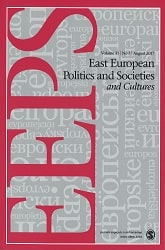The Shaman, the Greengrocer, and “Living in Truth”
The Shaman, the Greengrocer, and “Living in Truth”
Author(s): Jonathan BoltonSubject(s): Political Philosophy, Political history, Novel, Czech Literature, Government/Political systems, Sociology of Politics
Published by: SAGE Publications Ltd
Keywords: Václav Havel; Egon Bondy; Power of the Powerless; dissidence; greengrocer;
Summary/Abstract: This article turns to Havel’s contemporaries in the Czech music underground to look at earlier uses of the phrase “living in truth.” I focus on Egon Bondy’s 1976 novel The Shaman, where truth is portrayed in mystical terms as a form of transcendence achieved through solitary spiritual training—a mental state that is divorced from political opposition. Havel repurposes the idea of “living in truth,” avoiding mystical notions in favor of civic engagement, but he also steers clear of the romance of “dissident stories” about people persecuted for such engagement. I explore why Havel’s famous story of the greengrocer is so weak on motivation; rather than painting a scene or creating a three-dimensional character, Havel gestures weakly at the greengrocer’s sudden transformation into an oppositional figure. Havel also consistently uses scare quotes around the phrase “living in truth,” registering his own discomfort with a phrase that is inspiring, yet plays into dissident clichés. I see The Power of the Powerless as delineating a version of dissident truth while remaining skeptical about its transmission; Havel skillfully mixes pathos and irony as he considers the role of “dissidents” caught between Czechoslovak realities and Western expectations.
Journal: East European Politics and Societies
- Issue Year: 32/2018
- Issue No: 02
- Page Range: 255-265
- Page Count: 11
- Language: English
- Content File-PDF

